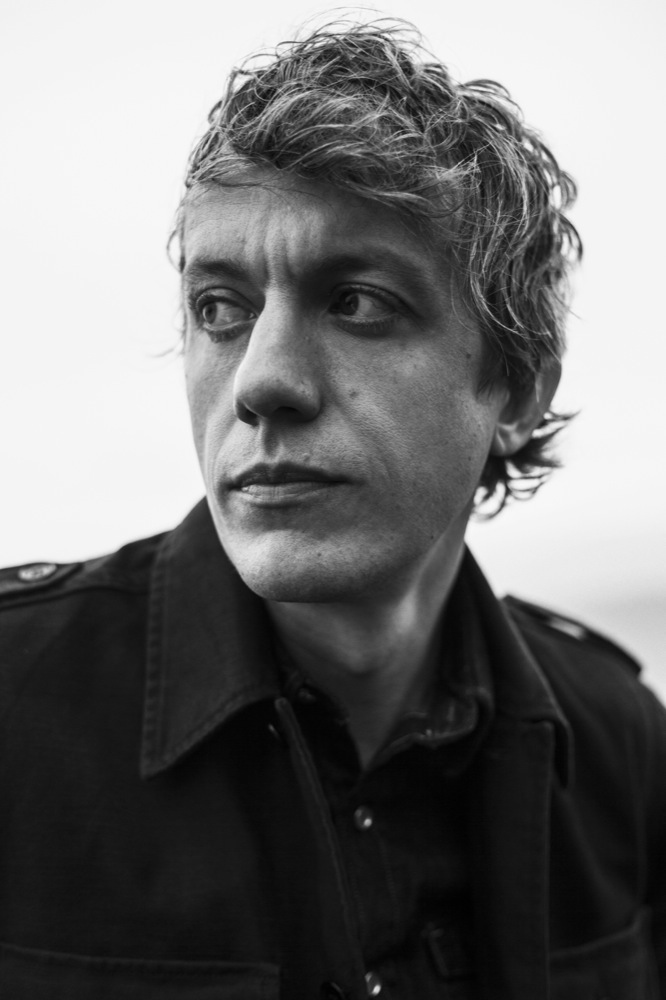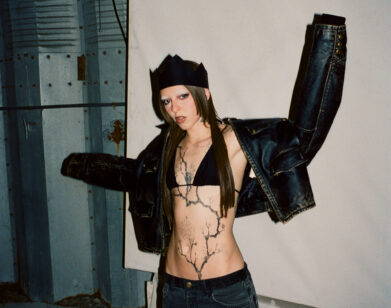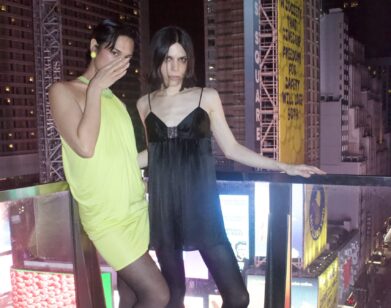Steve Gunn
STEVE GUNN IN NEW YORK, MAY 2016. PHOTOS: VICTORIA STEVENS. STYLING: TAYLOR MCNEILL. GROOMING: JENNY KANAVAROS/HONEY ARTISTS USING GLOSSIER.
Steve Gunn makes music that feels like it was tailor-made for road trips—expansive, panoramic, full of twists and sharp left turns. A gifted guitarist and clever songwriter, the Brooklyn-based musician has been honing his craft for years, writing and recording with the likes of Hiss Golden Messenger, Mike Cooper, The Black Twig Pickers, and playing in Kurt Vile‘s band, The Violators. Since releasing his first solo album in 2007, Gunn’s sonic palette has gradually expanded from lo-fi home recordings made alone in his bedroom into kaleidoscopic, full-band productions. His songs coolly blur the line between gentle singer/songwriter fare and noodly psychedelia while also giving passing nods to winsome folk music and Grateful Dead-worthy stoner jams. His music, much like the narratives in his songs, contains multitudes.
On his new album, Eyes On The Lines (out next Friday, June 3), the Pennsylvania native manages to expand his sonic universe even further with a collection of songs wrapped up in movement and the language of dreams. The characters in these songs are all caught between lines—horizon lines, highway lines, pickup lines, guitar lines—and they move through these songs with the kind of casual grace that is reflected in Gunn’s calm baritone. As was the case with his previous solo outings, Eyes is imbued with a refreshing strain of optimism and openness. Even though these songs are often about getting lost and the long hours spent trying to find your way back home, Gunn himself never sounds stressed. In fact, getting lost is often the most telling part of the journey. “Figure it out,” Gunn sings on the album’s opening track, “Take your time, ease up, and waste the day.”
T. COLE RACHEL: You’ve been making music and recording music for a long time-—longer than a lot of people probably realize—and doing so in a lot of different permutations with a lot of different people. In terms of your own solo records, has the process of song making changed radically over the years?
STEVE GUNN: It has, yes. Originally, almost 10 years ago, I was more into bedroom-style recordings and I was playing a lot of improvised music with other people, so the actual songwriting stuff was more private. The first official album that I made where I was also singing, I made in my apartment. I recorded it in my living room and mixed it on my computer and then sent it to the label. It’s really low-fi. Then slowly I took these small steps towards doing something bigger. For the next album I was playing with a band, just with drums and a guitar. My friends were backing me up. So for a while I decided to try it out as a trio.
Then I had a bunch of new songs so we did some gigs with the trio. My friend who’s in my band lives upstate and owns a studio, so we decided to go up there for the weekend and crank out these songs and basically cut the thing live. That was Time Off in 2013, which was the first album that really started to take advantage of using a studio properly. Over time I got more interested in recording and engineering, which really shows on this new one. The songwriting is starting to become more specific, the songs themselves are more cohesive. There’s a much more thought-out process involved now.
RACHEL: It’s a really rich-sounding record. The production is amazing.
GUNN: I think there is always room for improvement and there is a learning curve for each record. Like, maybe this time I need to sing a little better, or maybe we can mic things a little differently, or try different arrangements…that kind of thing. The person who’s my engineer, we’re growing together a little bit. He’s always buying new microphones and trying different things, so I feel like we’ve improved the sound collectively.
RACHEL: Your music draws such interesting comparisons—everything from jam bands to psych rock to jazz. There is also always something kind of sprawling and expansive about your songs, the way they stretch out in different directions.
GUNN: I know what you mean. That’s one thing that I’m trying to get away from, to be honest. For me, when I first started making songs, it was, “How do I make this song less than eight minutes?” because I just couldn’t. The way that I fell into writing songs was almost backwards. I was more of a guitar player and I wasn’t really conceiving songs or really even thinking about them; I was only sort of singing, and I got caught up in just doing these super-repetitive meandering parts.
RACHEL: There’s something to be said for that though. It’s the meandering nature of your songs that really made me a fan. They are like these self-contained, winding narratives.
GUNN: You’ve got to find a balance though, otherwise…
RACHEL: Yes, you’ve got to do it in a way that it doesn’t become boring. But your songs never bore me. I appreciate the way they mutate and change and become something else.
GUNN: I realize that there’s a divide for me now, between the live band and the album, and between the way that the songs are recorded and the way they are played. It’s like there is a bit of spontaneity, even when we’re making a record. I want to retain some spark of spontaneity. I don’t want to go out there and just play the same stuff. The guys that I play with—who are all good friends—we just try and keep it loose. For this new record, the live interpretations of the songs will likely change a little bit. Nothing drastic, but I like there to be an openness to it.
RACHEL: How long have you been playing guitar?
GUNN: Since my early teens—13 or 14 years old, maybe? I grew up in the suburbs of Philadelphia and I played sports. I was a middle class kid and in my town there was a place called the Lasdowne Boys Club, which is this community-involved club with baseball, basketball, all the sports. Everyone’s family was involved somehow—the moms bring in oranges, the dads are coaches, and you know everyone there and you’re playing all of these different sports. So I did that and was really active, but I also had an older sister who was into music. My parents were into music, too, but my older sister was into punk rock so I got really interested in that at a pretty young age. She was going to concerts and I kind of latched onto her. So when I was 13 I went and saw Danzig and all of these other punk shows, and that was pretty big. In retrospect, it’s kind of hard to believe.
As you’re getting a little bit older in high school, you kind of have to figure out where you want to spend your time outside of school and I just didn’t want to play sports anymore. Instead, I focused on music. My parents were really supportive, taking me to lessons and stuff. That’s when everything just kind of opened up for me. I was listening to a lot of college radio and absorbing all of that music, plus I was hanging out in record stores—a place in Philly called Philadelphia Record Exchange—and I learned a lot from that.
RACHEL: You have such an interesting style as a guitar player. Did you ever study jazz?
GUNN: Not really, no. I kind of did the basics in lessons, and then a lot of what I was learning after lessons was mostly by ear. I did listen to a lot of jazz guitar players and I started really getting into Middle Eastern and Indian music. A little bit later, I started messing around with open tunings, which means you abandon all your scale lessons and learn how to navigate the guitar a little bit differently. I could only really sing in a certain key, so my playing also shaped itself around that.
RACHEL: So much of this record is about movement and about dreams. For a working musician, touring—the need to always be going somewhere—is kind of a necessity. Does that aspect of being a musician inspire you?
GUNN: Well…I live in New York and I spend a lot of time working jobs as a means of sustaining my ability to make music. I knew that if the opportunity presented itself to just make the leap and try and live as a full-time musician, I’d do it. I was working as an art handler, and that position for me was good, but it’s also a bit demeaning. To be working in the art world and seeing the grotesque business transactions happening and experiencing just how people are treated in a very service-industry type of way and the way you were often totally disrespected, well, it made me work harder to see if I could make a living as a musician. Part of the reason I was on the road so much last year was because I never wanted to say no to anything. I wanted to make that leap.
You know, if I’m in an airport and I miss my flight or I have to bring my guitar case and my suitcase into a bathroom stall with me—all that stuff that touring musicians have to deal with when you are traveling alone—I really try to value the fact that I can actually do it. I’m pretty grateful about just being able to travel and play and meet people, because it’s what I’ve been working toward for so many years. I just have to poke myself in the chest sometimes. On the other hand, it’s not easy if you have to make life choices, and there’s a struggle between living, and not having a solid foundation, or a solid home, that kind of thing. For me, I’m lucky to have people in my life that understand and respect what I’m doing. I really cannot complain.
RACHEL: There is a funny reference to New York City on the record that involves seeing rats on the subway platform and how even that can seem comforting sometimes when you’ve been away for a long time. New York is funny that way.
GUNN: For me, it’s great to leave NYC and it’s also great to come back. I miss it when I’m gone. Sometimes I need to get out of here and I have that feeling like I need to move upstate, or just move to another country, but I don’t know. I’d miss it. I’m in a privileged sort of position where I can leave and come back. I’m not stuck in a grind, taking the subway to work everyday, or anything like that.
RACHEL: Eyes On The Lines kept making me think of horizon lines and highway lines and the experiences of driving alongside power lines.
GUNN: I had a bunch of titles that I was thinking about, but this one seemed to be the most fitting. Traveling so much, you get very used to just being in a vehicle and looking out the window. When you are passing by the scenery there are constants that your eyes can follow—things that kind of help you relax—and one of them was the lines on the side of the road. Also, I remember being at this very depressing rest stop in Birmingham, England with all of these truckers and I remember having one of those moments where you just start to think, “What am I doing here? How did I end up here?” But then I started staring at the lines in the road and it put all of it in perspective. I also like that the title can have multiple meanings. There are so many sorts of lines—horizons, power lines—and I also liked the idea of reading lines or speaking your lines, that kind of thing.
RACHEL: You’ve spent a lot of time playing in bands where you were not the front person. Was it hard to get used to being in a situation where all the attention is always focused on you?
GUNN: Yes. It took a little getting used to. You know, my songs aren’t really overly confessional. They’re personal, but not exuding any kind of “diary” stuff. In a sense, I’m hiding behind something, and I kind of like that. I like having that sense of mystery to it all—the context of the words and how you want to interpret them. Obviously, you can get a sense of what I’m saying, but I’m still trying to detach myself from the stories in the songs. It took a little while to let my guard down when I talk, and the first time I started doing it, I felt like I was too specific about certain things and said too much. Ultimately, I like to have this open-ended-ness about certain things, and I’ve gotten a little bit better about being able to talk about things in that way.
RACHEL: Are you surprised by how much your audience has grown over the past couple of years?
GUNN: To be honest, I still cannot believe I’m actually doing this. Even today, I’m here at a styled photo shoot. It’s hard for me to comprehend. What I really value is when people really listen to me and my music and want to have a conversation about it. I love talking about my music—and just music in general—and I value that someone is interested in this.
RACHEL: I’m always struck by the optimism of your music. There is always this generosity of spirit to what you do. It never feels mean-spirited or like a bummer. That’s surprisingly rare in contemporary music, so much of which is super negative or totally depressing.
GUNN: Yeah? Cool. Thanks for saying that. That’s an important aspect of it for me, just being hopeful and positive and grateful for being able to do it. I think you have to consider what your expectations are in life, what you are doing, and not have these preconceived notions about what things are or what they have to be. I think about that kind of stuff a lot. I like to have a kind of loose, sort of improvisational perspective on music and on life in general. It sounds corny, but I just want to be present and appreciate what’s going on—not just be lost in my own mind and perpetually distracted. I don’t want to miss out on the good things, you know?
EYE ON THE LINES WILL BE RELEASED NEXT FRIDAY, JUNE 3, VIA MATADOR RECORDS. FOR MORE ON STEVE GUNN, VISIT HIS WEBSITE.







